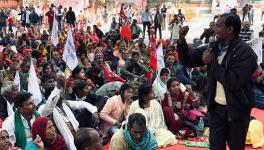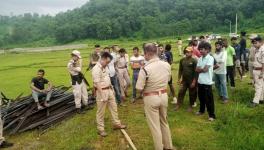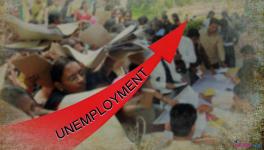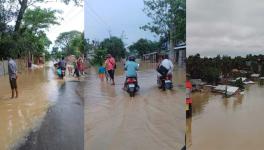COVID-19 in Rural India-XXXV: How Assam’s Atugaon Is Coping With Lockdown
Representational Image.
This is the 35th report in a series that provides glimpses into the impact of COVID-19-related policies on life in rural India. The series, commissioned by the Society for Social and Economic Research, comprises reports by various scholars who have been conducting village studies in different parts of India.
This report is from Atugaon village, which is located in Bongaigaon district, Assam. Atugaon, along with five other villages, falls under the Atugaon Gram Panchayat. The Gram Panchayat includes 1,130 households with a population of 4,579 individuals; the total number of males is 2,457 and the number of females is 2,522. Atugaon village comprises 475 households with a population of about 1,765 individuals (875 males and 890 females). All the households in the village are Hindu; thirteen households belong to the Rabha community (ST), one household to the Sutradhar community (SC) and the remaining 461 households belong to the Koch-Rajbongshi community.
For this report, I conducted in-person interviews with a number of respondents in the village on April 16, 2020. I am a native of Atugaon and am currently in the village due to the lockdown. My respondents included the president of the panchayat, a duck meat seller, a homemaker and a government school teacher.
The main market for the village is situated in Mulagaon, which is only about one km away. In normal times, there is a haat (market) held at Mulagaon twice a week at which vegetables, petty goods and meat are sold. There is a branch of the State Bank of India in Mulagaon, which has an ATM—these are the closest available banking facilities for the residents of Atugaon. The nearest town to Atugaon is Bongaigaon, which is about 10 km away. Bongaigaon town has banks, schools, hospitals and a railway station. In recent years, the availability of transport has made it possible for villagers from Atugaon to make frequent visits to the market in Bongaigaon.
Agriculture and other employment opportunities
The villages in Atugaon Gram Panchayat depend mainly on paddy cultivation. Sharecropping is common in the area, and there are two types of sharecropping practiced here: adhi and kutani. Adhi involves the owner of the land and tenant-cultivator sharing the cost of agricultural inputs as well as the output, whereas kutani involves the sharing of the output by both the landowner and tenant-cultivator, but with the latter bearing the entire cost of cultivation.
Paddy is cultivated between April and December. Farmers generally begin preparing the land (ploughing) between April 15 and May 15. The sowing of the paddy is usually done between June 15 and July 15. Owing to the lockdown, land preparation operations had not yet been carried out when I conducted my interviews. Farmers hope they will be able to purchase the required inputs, such as fertilisers, seeds and tractors, in time. Some households also grow vegetables on their agricultural lands.
In addition to agriculture, some households rear Jersey or cross-breed milch cows and sell the milk. Several young people in the village work as labourers in construction. There are some workers registered under the MGNREGS, but there has been no work available under the scheme during the lockdown.
Impact on the availability of essential services and commodities
Two grocery shops in Mulagaon village have been allowed to operate during the timings specified by the district commissioner. However, the biweekly haat in Mulagaon is not operational. The farmers of Atugaon rely on the haat for some essentials, such as fodder for cows. During the lockdown, fodder for cows is available in only one shop since the haat is closed. The lockdown has also limited the availability of fodder for poultry. Due to this, the owners of poultry farms sold off their chicken for cheap rates during the early days of the lockdown. The price dropped as low as Rs 70 per kg— for comparison, the pre-lockdown price for one kg of chicken was about Rs 200. Also, rumours that the virus can spread through poultry caused widespread panic, and many poultry farms ceased operating about two weeks after the lockdown began. This caused a shortage of chicken in the local market. Some enterprising households have begun rearing broiler chicken now in the hope that they can fill the supply gap they foresee occurring.
The villagers rely on the Bongaigaon town market (Boro Bazar) for fish, meat (other than chicken) and vegetables. But the market ceased to receive new supplies immediately after the lockdown was declared. Fish sales resumed in the second week of April, albeit at higher prices: fish that earlier cost Rs 200 per kg was being sold at Rs 400 per kg.
Most households rear cows, goats, chickens and ducks for domestic consumption, and so have access to eggs and milk. These cows are jati (native common breed) cows and the milk they produce is retained for household consumption.
Also read: Also read: COVID-19 in Rural India-XXXII: Impact of Lockdown on Mettavalasa Village in Andhra Pradesh
During the first few weeks of the lockdown, the villagers were mostly dependent on vegetables grown in their backyards, such as colocasia, jackfruit, drumstick, and local greens. During the lockdown, some who grew vegetables in their fields were allowed to leave their homes in the early afternoons to harvest vegetables. Also, from the first week of April, three vegetable sellers have been allowed to bring their carts into Atugaon. These vegetable sellers were certified by the president of the panchayat.
Relief measures and COVID-19 preparedness
Rice distributed under the public distribution system has provided some relief to people in the village. According to the president of the panchayat, under the directive of the district commissioner, Rs 1,000 were credited to the accounts of those who do not have ration cards. However, availing free LPG cylinders under the Ujjwala scheme has proved much more difficult. The paperwork required to obtain these has been difficult to put together as photocopy shops are not working and many bank processes are slower or not available during the lockdown. The panchayat president monitors the movements of people within the six villages under his purview. Villagers have been asked to avoid gathering to celebrate the festivals of Bohag Bihu and Pahari Puja that occur during this time. A woman who travelled to the panchayat from a sealed village (Chapar) in a neighbouring district (Dhubri) was reported to the district-level authority, and subsequently asked to home quarantine.
The local police make regular visits to check that there is no crowding in markets. There are rumours in the village that people are being beaten up by these police patrols. However, local tea shop owners and shopkeepers continue to open their establishments despite their fear of the police. Since gathering in public spaces is prohibited, empty paddy fields away from the village centre have become a place for young people to gather to exchange news or play card games. The local youth have also formed a Bihu festival organising committee and are trying to help people in need.
I summarise here the experiences and concerns of three of my respondents.
Mizen Singha, a butcher
Fifty-year-old Mizen Singha is a duck meat seller. He purchases ducks from Muslim duck-sellers, who come to Atugaon from nearby villages. These duck sellers rear ducks themselves and also sell ducks on behalf of other duck farmers. However, the villagers have stopped buying meat sourced from Muslim duck-sellers after the Tablighi Jamaat affair came to light and was the focus of the media for several weeks. For Singha, this has meant that he no longer has a supply of duck meat, which has severely impacted his business. Mizen Singha has been suffering from chronic dysentery for several months, due to which he cannot travel. He and his family now depend entirely on selling vegetables grown on their land and fresh betel nuts (tamul).
Sobita Das, a mother of four
Thirty-year-old Sobita Das lives with her husband and four children on land leased from a landowner. Her husband is a car mechanic, but he has been out of work since the lockdown began, and has fallen prey to alcoholism. During the agricultural seasons, Sobita works in sowing and reaping; she is hopeful that she will be able to find employment when the agricultural season begins. She supplements this income by weaving handloom garments at home, but the lockdown has interrupted the supply of thread and so she has been unable to continue her work. She has not received the anganwadi rations two of her children are entitled to, and she is heavily dependent on PDS rice rations. She received some rice, dal, mustard oil and soap, sufficient for about a week, from the local Bihu festival organising committee.
Bedabrata, a cultivator
Bedabrata is a thirty-eight year old qualified government teacher. Along with a colleague, he engaged in strawberry cultivation for the first time last year. The two colleagues also grew vegetables that they then sold at the market. This year, however, Bedabrata is worried that he will not be able to get good quality seeds in time as the seed markets are closed during the lockdown.
Concluding remarks
The key points that emerge from the interviews with respondents in Atugaon are as follows. The residents of the village have not been able to prepare their land for the cultivation of the kharif crop during the lockdown. Workers registered under the MGNREGS have not been provided work during the lockdown. The availability of fodder for cows and poultry is very limited, which resulted in the owners of poultry farms selling off their chickens for cheap rates during the early days of the lockdown. Those in non-agricultural self-employed occupations have been severely affected by the lockdown, including women engaged in home-based handloom works, who cannot continue working as they do not have access to the necessary supplies.
Also read: COVID-19 In Rural India-XXXIII: Villagers from Gijhi Fear Starvation of People, Cattle
The author is a research scholar at Department of Humanities and Social Sciences, Indian Institute of Technology, Guwahati.
Get the latest reports & analysis with people's perspective on Protests, movements & deep analytical videos, discussions of the current affairs in your Telegram app. Subscribe to NewsClick's Telegram channel & get Real-Time updates on stories, as they get published on our website.
























